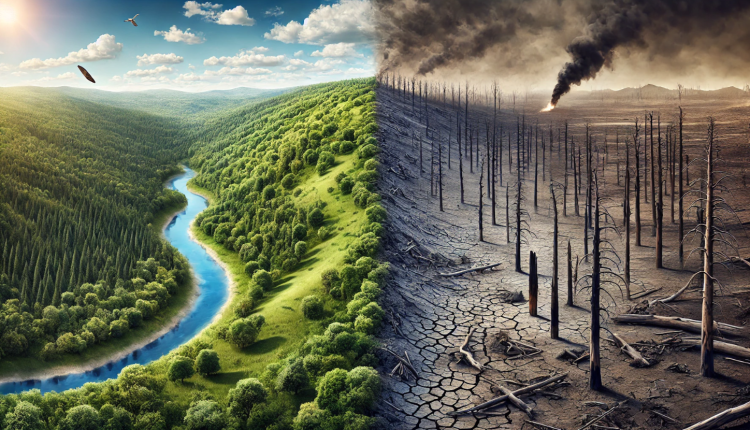- Advertisement -
Climate change is a pressing global issue that significantly affects ecosystems worldwide. The increasing concentration of greenhouse gases in the atmosphere leads to rising temperatures, altered precipitation patterns, and more frequent extreme weather events. These changes disrupt the delicate balance of ecosystems, leading to biodiversity loss, habitat degradation, and altered species interactions.
Effects on Terrestrial Ecosystems
Terrestrial ecosystems, including forests, grasslands, and deserts, are experiencing profound changes due to climate change. Increased temperatures and altered precipitation patterns can shift vegetation zones, forcing species to migrate to more suitable habitats. However, not all species can adapt or move quickly enough, leading to population declines or extinctions. Additionally, climate change can exacerbate the spread of invasive species and pests, further threatening native biodiversity.
Effects on Marine Ecosystems
Marine ecosystems are equally vulnerable to climate change. Rising sea temperatures contribute to coral bleaching, where corals expel the symbiotic algae essential for their survival, leading to large-scale reef die-offs. Sea-level rise, resulting from melting polar ice and thermal expansion, can inundate coastal habitats, affecting species that rely on these areas for breeding and feeding. Furthermore, increased carbon dioxide levels lead to ocean acidification, impairing the ability of marine organisms like shellfish and corals to build their calcium carbonate structures.
Effects on Freshwater Ecosystems
Freshwater ecosystems, such as rivers, lakes, and wetlands, are also impacted by climate change. Altered precipitation and increased evaporation rates can lead to changes in water availability, affecting species dependent on specific hydrological conditions. Additionally, higher temperatures can reduce dissolved oxygen levels in water bodies, stressing aquatic life. The increased frequency of extreme weather events, like floods and droughts, further disrupts these ecosystems, leading to habitat loss and decreased water quality.
Mitigation Strategies
Addressing the impacts of climate change on ecosystems requires comprehensive mitigation strategies aimed at reducing greenhouse gas emissions and enhancing carbon sinks. Transitioning to renewable energy sources, such as wind, solar, and hydroelectric power, can significantly reduce emissions from fossil fuels. Implementing energy-efficient technologies and practices in industries, transportation, and households further contributes to emission reductions. Additionally, protecting and restoring forests and wetlands enhances their capacity to sequester carbon dioxide, serving as vital carbon sinks.
Adaptation Strategies
In addition to mitigation, adaptation strategies are essential to help ecosystems cope with the inevitable changes brought by climate change. Conservation efforts should focus on creating and maintaining ecological corridors to facilitate species migration to suitable habitats. Implementing sustainable land and water management practices can enhance ecosystem resilience. Furthermore, integrating climate change considerations into policy and planning ensures that conservation and development efforts are aligned with the realities of a changing climate.
Conclusion
Climate change poses significant challenges to global ecosystems, affecting biodiversity, habitat integrity, and species interactions. A combination of mitigation and adaptation strategies is crucial to address these challenges effectively. By reducing greenhouse gas emissions and implementing sustainable management practices, we can enhance the resilience of ecosystems and preserve the invaluable services they provide to humanity.

